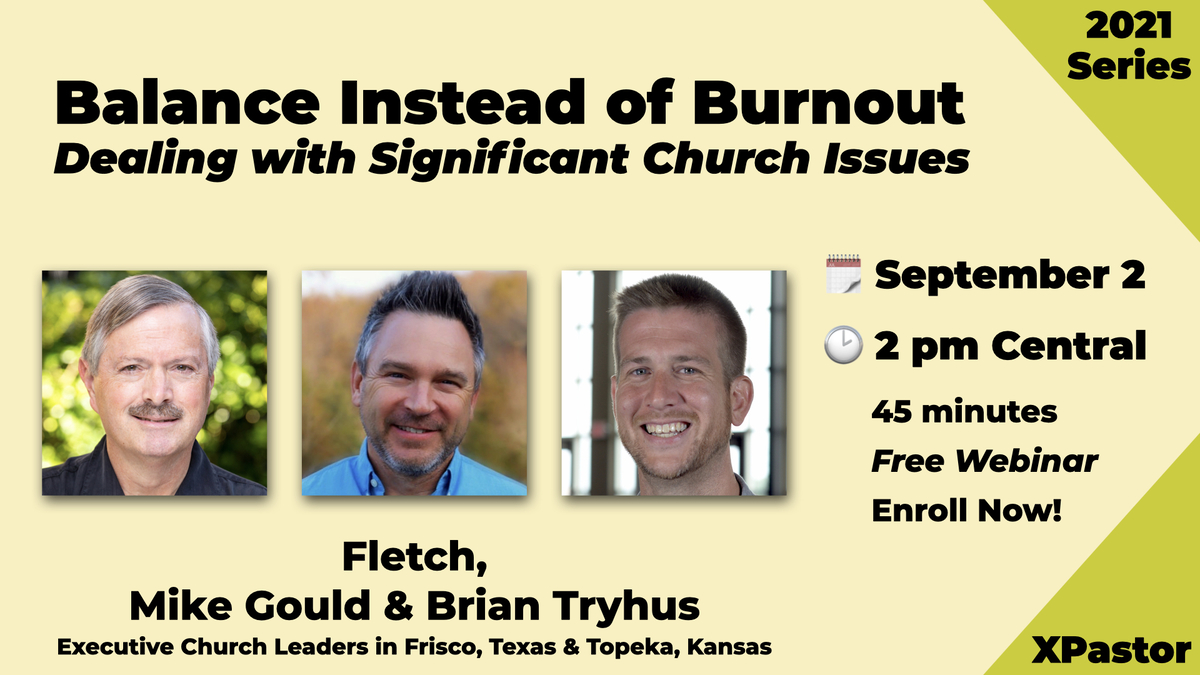Every faith-based organization—especially churches—should set itself apart from its business and government counterparts by putting a sabbatical policy in place not as a perk or a benefit but rather at the heart of its organization’s employee policy. Here’s why.
Sabbath is God’s Design for Creation
The Biblical concept of Sabbath begins in Genesis 1 with God resting on the seventh day and ends in Revelation 22 with Jesus declaring all things have been and are being made new. Throughout Scripture, commitment to rest is an expectation of God’s people, their land, and their finances. As tempting as it may be to question one’s need for Sabbath, Sabbath is not a breather so that a pastor can jump back in at a similar pace. It is humanity’s intentional return to the rhythm God set forth in Creation. It is a glimpse into the eternal Kingdom of God where rest and joy are the norm rather than work and stress.
Sabbath is a Marker
It sets apart those who are committed to a Kingdom of God on earth as in heaven. The Hebrew practice of Sabbath in the First Testament became two things—a marker differentiating the people of God from their neighboring tribes and a rhythm that valued people over production. More than a principled countercultural act, though, it was a statement to all about the true nature of humanity. We are made for rest as much as we are made for work. Taking Sabbath—including sabbaticals—publicly declares that God knows what God is talking about when it comes to our need to rest from activity.
Jesus
Jesus maintained a rhythm, moving back and forth between ministry and solitude. Above all, sabbatical policies remind us that Jesus is the sustainer of our efforts, not an individual, team, program, or strategic plan. If an organization claims to follow Jesus’ call, then it must also follow Jesus’ call to rest (Matthew 11:28). Sabbath, and sabbaticals in particular, remind us that God can and does provide when we are uncomfortably still in God’s presence for longer than a few moments.
Community Experience
Sabbath is not only an individual experience; it is also a community experience. Right or wrong, good and bad, Western churches are pastor-centered. When a pastor is on sabbatical, not only does the pastor rest, but ministries as well. Or to be more honest, sometimes we all need a break from each other! In addition, sabbaticals require stillness for the individual while teaching a sense of calm to the short-handed team. They require peace of mind that some tasks that are usually completed may go unfinished. Honoring Sabbath teaches us to rest from our worry, our dependency on achievement, and from our self-inflicted sense of obligation to our constituents.
Confession of Faith
Sabbath is a confession of faith in the ongoing pattern of life, death, and resurrection. God remains at work, even (and perhaps especially) as we rest. Humbly we anticipate the fruit of the generative Spirit of God. Sabbath is designed by God as a time of stillness that carries the hope of new life. For the individual, the soul lies fallow for a period, anticipating that something new will be re-born from that rested soil. For the organization, team members returning from Sabbath will have sat with and heard from the God of creation and the Firstborn over all creation.
Questions for Reflection
- Which of these rationales do you find most convincing? Why?
- Which of these rationales do you find least convincing? Why?
- Describe a time in your own life when rest was restoring, not just a break.
- What were you taught about rest and activity? In what ways has your view changed?
How to Deign a Wise Sabbatical Policy
Document and Model Sabbath
Write it into the employee policy. Ensure that leadership participates and holds the entire team accountable to its sabbatical policies. Establish the rhythm immediately upon hire of a new employee. Also, board members, elder committees and volunteer leaders need sabbaticals. Be consistent throughout your church on the need for rest.
Be Clear about Eligibility
Often eligibility is nothing more than a hand raised with a desperate request for time off. By that time, burnout is well underway. Despite its biblical significance, seven years between sabbaticals is likely too long. Three may feel too soon, though year three is often critical in the lifespan of a pastor on staff. Five is probably ideal for most churches.
Practice Wise Timing
Practice wise timing with your sabbatical policies. Whenever possible, space the sabbaticals so that your organization isn’t crippled by having more than one employee from the same team out at the same time.
Be Clear
Be clear about how the employee will invest his or her time. Sabbaticals should be the rhythm rather than an interruption to rhythms of ministry. If that is true of your church, then sabbatical plans should be written no less than six months in advance and need to be included in the organization’s annual budget that is approved by the board of directors. See the next section for suggestions.
Prepare
Don’t just depart on a sabbatical. Prepare. Ask your employee to write or video how s/he is doing when they leave. Having a baseline allows you and the employee to see how God was at work during the sabbatical. Prior to the sabbatical, your staff member should spend time with supervisors, mentors, and spiritual directors or therapists to discuss where healing is needed, not growth. Growth will occur in the presence of healing, but we cannot grow past our own pain.
Suggestions for Sabbatical Rest
Solitude
Spend extended time in solitude at a retreat center. Here are two key questions to ask: 1) Where does your pastor find wholeness and rhythm? Send her or him there. A retreat center might be an AirBnB in the mountains or on a beach. 2) This span of time should feel uncomfortably long. A day or two is not enough. Ask a spiritual director to help your staff member use that time well.
Repair and Enrichment
Schedule time for relational repair and enrichment. While a marriage may be the natural response, relational repair and enrichment is just as likely to needed with friends, parents, or children. Is one or more of those relationships lacking or in need of attention? Invest time in them.
Get Good Advice
Spend time with a therapist and a spiritual director. Both helping professions provide needed insight into the state of our emotions, actions, and thoughts. If the pastor is doing the first two well, there will be plenty of content to explore. Note: resist skill-related coaching.
Vacate
Take a family vacation. Schedule the sabbatical to include a time when all of the family can rest together, away from everyone’s busy-ness. When it comes to the cost of taking a vacation, see the note below about expenses.
Cross Cultures
Consider cross-cultural experiences, especially to see the Kingdom of God flourishing in non-Western contexts. While this might be a brief time with a missionary supported by your church, be wise about placing your pastor into a space where s/he is on the clock. An experience outside of their circle of influence may be a better option.
Write
Journaling is a non-negotiable. The medium (writing, videoing, drawing, etc.) is less important than the rhythm. Mastery or length isn’t necessary. A 30-second video on a mobile device or a two-sentence diary entry may be enough of a discipline to serve its purpose: to capture the formative power of rest as it happens.
Enjoy
Enjoy life. Do something you’ve never done before. Be adventurous. Cross something off that bucket list.
How Do We Help Our Teammate Rest?
We first focused on why and how a sabbatical should be planned rather than occasional. Now, let’s dig further into how to maximize the value of a sabbatical for everyone, and then to capture as much of that rested energy as possible upon re-entry. Sabbaticals are the moment at which we can demonstrate what it means to be rather than do. To allow a person to be on sabbatical, we’ll need to lead the way in making it easier for our team member to free herself or himself from all of the things that tether us to work: technology, access, education, and financial worries.
Freedom from Technology
A sabbatical without access to technology may feel more like a Lenten fast than like a sabbatical. However, technology allows work and obligation to chase us wherever we go. A strong sabbatical policy will include what technology an employee is allowed to keep during the sabbatical. This may include a policy to delete email apps from smart phones, turn off mobile notifications, forward all work-related calls to other team members, and turn in any office-owned laptops or tablets before leaving. It may even mean abstaining from social media, gasp!
Freedom from Easy Access by Church Members and Team Members
Under no circumstances should an employee contact someone on sabbatical. Period. Tragic circumstances or family emergencies are the only reasons I can think of that would be worthy of breaking the sabbatical. Any clients or donors or other constituents who would normally interact with the employee on sabbatical should be informed well in advance of the team member’s scheduled absence.
Freedom from Work-Related Education
Many sabbatical policies insist that the person on sabbatical take a course that benefits the organization. I’d like to push back on that assumption. There is a time to learn new skills relevant to our work; that time is not while on sabbatical. Both the organization and the employee will be tempted to frame a conference or a university course as a sabbatical. Don’t fall victim to that, even and especially if the employee on sabbatical finds education to be restorative.
There is a place for education while on sabbatical, though. Learn a new skill completely unrelated to work. Learn how to cook or build something or to play a new instrument. Learn how to better relate to a spouse or family member. This is generative learning with strong neuroscience behind it—a Sabbath free from work development gives us better opportunities to grow new synaptic connections rather than reinforcing well-established habits.
Freedom from Financial Strain
Of course, pay regular salary and benefits should be continued during the sabbatical. It should also go without saying that an employee should not be removed, reassigned, or promoted while on sabbatical, but it doesn’t. Sadly, this happens.
A goal for every organization that prioritizes sabbaticals is that the employee on sabbatical incurs no out-of-pocket expense for any expectation written into the policy. For example, if therapy or spiritual direction is a requirement then that expense should be covered. The cost should not fall on your staff member. This principle may require long-term transtions in budgets, but current financial restraints should not determine the efforts to meet this goal.
Poorly budgeted sabbaticals strain the resources of the person on sabbatical. Poorly communicated expectations about costs incurred while on sabbatical can lead to disappointment at best, resentment at worst. A sabbatical budget should at least include the cost of a guided retreat and the travel expenses required of such a trip. The more generous sabbatical budgets could include a stipend to be spent at the staff members’ discretion to cover unexpected costs. Among other things, this stipend could be applied to:
- Travel costs for travel to and from relational healing conversations.
- Cash to offset the cost of a family vacation.
- Therapist co-payments and/or spiritual direction fees
- Childcare while on a marriage retreat
A Wise Re-Entry
Re-entry can be as jolting as leaving on a sabbatical. An employee overwhelmed by work will lose some of the value of a sabbatical almost immediately. One way to prevent this common problem is for the staff member’s work to be completed by those who are not on sabbatical. A sabbatical is healthy in part because it leads other employees to ask different questions about the work of their teammate. Carrying the load of the person on sabbatical is a sacrifice that maximizes the positive return on the team’s investment in a sabbatical.
A better way forward is for your staff member’s programs and responsibilities to rest while the sabbatical is occurring. If the sabbatical is planned in advance, events that would normally take place during that time will also get a rest. In this way, your staff will model a commitment to operating at a different pace than the rest of the world.
Consider this strategy: announce to your constituents that the employee is gone one week longer than s/he actually is; you’ll give more time for your employee to re-acclimate to the pace of work with fewer demands and without the inevitable anxiety among some church members that will have accumulated. During that week, don’t ask them to jump back into a regular routine. Instead, consider coming back at half time for a week. Finally, let them pace themselves by doing what gives them energy first. A job description change is a common outcome of a well-executed sabbatical.
Upon returning, encourage the employee to make a written or oral report to the Board recapping their experience, offering any insights s/he gained, and any other stories or reflections. Generative experiences while on sabbatical will benefit not only the individual but the organization, your donors, and your recipients. Shared sabbatical experiences build community. Shared experiences increase buy-in from our own organization as well as among our constituents.
Conclusion
Sabbaticals are not a luxury. They are not emergency measures to hopefully keep the staff member on the team a little longer. They are not afterthoughts.
They are a confession that the Western speed of life is not sustainable. They are a commitment to the rhythm of life God imagines for creation, of which humankind is a part. They are a belief that humans are a unique expression of Imago Dei and we should therefore treat one another in a way that reflects that truth.
Reflection Questions
- What are you already doing well in your sabbatical policies?
- What first steps can you take that are free and easy to accomplish?
- Where will you be most challenged to improve your sabbatical policy?
- What does your church need to learn about rest?
- How might you use a sabbatical to teach?











